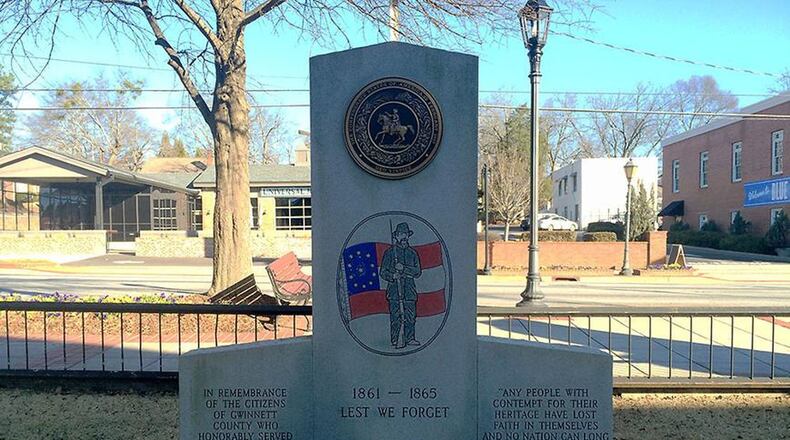Gwinnett’s historic preservation board has recommended a Confederate monument erected in 1993 be removed from the Lawrenceville square.
Saying the statue is “not history,” Aaron Ragans, chair of the county’s Historical Restoration and Preservation Board, called the vote to take down the memorial a “moral decision” as debates rage across the country over what to do with Confederate memorials.
“This is about being sure we do right by the people of the county,” said Ragans, who is white. “The Confederate States of America, a nation founded on the cornerstone of slavery, doesn’t have a place in a public square in the United States of America in 2020.”
The board voted 3-1 to remove the statue from county property in Lawrenceville while more discussions take place about where it should go. State law restricts the ability to remove monuments, and the group can only make recommendations to the Gwinnett Board of Commissioners.
Commission chairman Charlotte Nash has said she cannot discuss any plans for the monument because a lawsuit was filed by Gwinnett’s solicitor to have it taken down.
Joe Bath, Commander of the Sons of Confederate Veterans Camp 96 in Lawrenceville, said he wasn’t involved with the organization when they lobbied commissioners to place the memorial on county property. But he’s disappointed the monument, which was paid for with about $7,000 of private funds, could be taken down.
“It’s been there 27 years,” he said. “It hasn’t hurt a soul.”
Several members of the preservation board would disagree.
Marlene Taylor-Crawford, the board’s vice-chair, said the statue’s presence is a constant reminder of brutality, white supremacy and hate. It’s near the site of several lynchings that took place in the county, she said, none of which are memorialized.
“It’s reminding us of everything wrong in this country,” said Taylor-Crawford, who is Black. “We are not going to have something thrown in our face every day to remind us of the white supremacy and racism that our ancestors had to face.”
The intent of the memorial isn’t racist, Bath said, but a way to honor Confederate soldiers from Gwinnett who died in the Civil War. He said the war “was not totally fought about slavery” and that Black re-enactors have participated in Sons of Confederate Veterans events.
That group, too, is interested in historic preservation, he said. But he said it’s a “foregone conclusion” that the monument will be taken down.
“I don’t particularly like it, but you can’t fight city hall, as they say,” he said.
Still, Bath and the board members agree about the monument’s designation.
“I think it’s an honor to history, not history itself,” Bath said.
Phyllis Davis, the member of the preservation board who voted against removing the statue, said she thought it was a matter for the courts to decide. Davis, who is white, said she got involved in the board to preserve history. She called the debate over the monument a political issue, and said it wasn’t fair to ask the board to weigh in.
A native of Gwinnett whose roots go back generations, Davis added that most Civil War-era families in the county — including her own — did not own slaves. She worried about removing a marker that honors those who sacrificed during the war.
The statue has an early Confederate flag etched into it, as well as a picture of a Confederate soldier and bears the dates 1861-1865 and the notation “LEST WE FORGET.”
Ragans called the wording “clever” in recommending it be removed, asking what, exactly, viewers were supposed to remember.
“It isn’t history, and we do a disservice by not having our voice heard as historians of the county,” he said. “I don’t believe this is a political issue. This is a matter of right and wrong. I think the only moral decision is to remove it. It doesn’t have a place.”
About the Author


